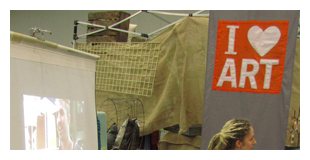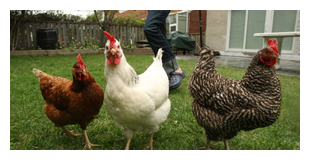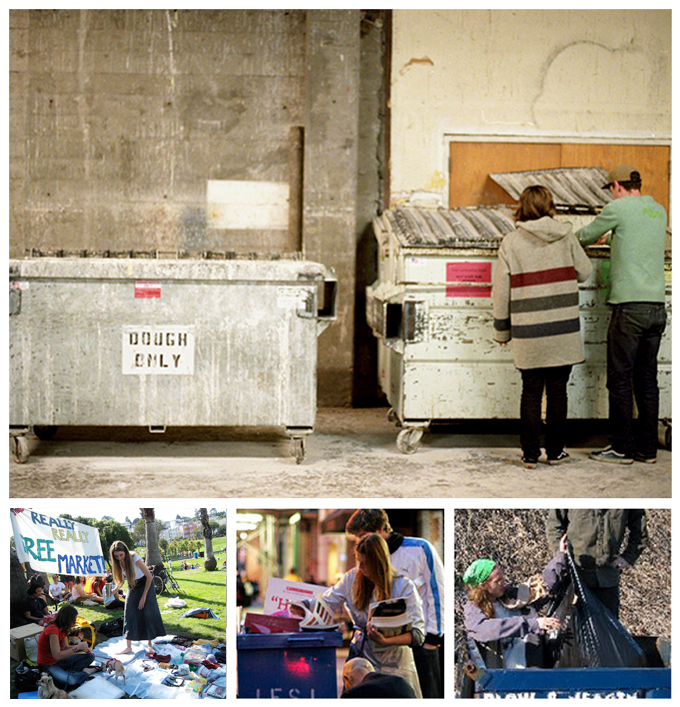Featured Indicators
 DIY
Many evolutionary biologists believe that our hands — a biological marvel unique to the human spec...
DIY
Many evolutionary biologists believe that our hands — a biological marvel unique to the human spec...
 Backyard livestock
Checklist for an enviable backyard: A sparking turquoise kidney-shaped pool with a waterfall f...
Backyard livestock
Checklist for an enviable backyard: A sparking turquoise kidney-shaped pool with a waterfall f...
Cultural Indicator
Freeganism

It used to be that anything in the garbage was, well, kind of gross. And to a huge swath of the American population, it still is. But something quite significant is happening to our culture these days, and the sorts of dumpster-diving freegans lampooned in Portlandia skits are but one extreme manifestation of this incredible shift that threatens to completely upend the spirit of conspicuous consumption that’s been beaten into our brains for generations.
What’s going on? It all comes back to reclaiming our evolutionary heritage as social animals, coupled with the enabling power of technology to provide platforms for reconnecting with our neighbors — whether next door or across the globe.
For most of human history, people lived in tribes and small villages. We knew everybody, we helped people out, and they helped us out. We shared things — skills, knowledge, time, resources. Barter was a way of life, and community was a necessity, not a buzzword. This was how we spent our history and prehistory, and this is how “primitive” cultures still live. Even the alienated housewives of the 1950s would still borrow cups of sugar and flour from one another, knowing that the favor would be repaid one day. This is not the place to rehash Bowling Alone, Putnam’s classic fin-de-siècle work on the shredded social fabric of American culture, but suffice it to say that we fell into a tattered state as binding ties and institutions fell apart (geographical mobility was a huge factor), and that the sorry state described in his book took us far afield from the environment we are built to thrive in — a place of comfortably-bonded communality and deep reciprocity. The concept of reciprocity goes back even further than our early days as hominids — biologist Robert Trivers coined the term “reciprocal altruism” to describe certain altruistic behaviors that might otherwise not make sense as survival strategies, and we can witness reciprocal altruism in many non-human species as well.
All this to say — we got ourselves into a terribly alienated state in the past few decades, and are only now beginning to climb out. Technology certainly has the power to alienate us from one another even further, but it’s also allowing for a new cultural paradigm to emerge. (Being in a global economic crisis also helps things along.) Theorists Rogers and Botsman have recently popularized the term “collaborative consumption,” and in their likely prescient 2010 book, they map out the rapidly changing landscape of consumption, focusing on the cultural adoption of web-based platforms that allow for peer-to-peer sharing of everything from cars and tools to clothing and homes. Wildly successful ideas like eBay, Craigslist, and CouchSurfing, along with burgeoning up-and-comers like Getaround and OurGoods, are changing the way we think about private ownership, and about one another. CouchSurfing’s adage — a stranger is a friend you haven’t met yet — is counter to the fear-based alienation that keeps many people rooted to closed-off lives.
Freeganism rests at the radical fringe of the collaborative consumption movement, and like many things at the radical fringes, it’s important to watch, because it tells us where we’ll be going once the mainstream catches up. Although dumpster diving has become an emblematic freegan activity, the movement is about much more than finding treasure in trash. It’s a profound act of defiance that celebrates generosity and cooperation as it creates strategies for sustainable living beyond capitalism. Freeganism comes from a recognition that our current materialistic and competitive socioeconomic system is fatally flawed, and it’s about being resourceful and caring, while participating in the conventional economy as little as possible and consuming as few resources as possible. Given that half of all recent college graduates these days can’t find jobs, freeganism as lifestyle is as driven by personal circumstance as much as it is ideology — although many wealthy people are shifting into a “voluntary simplicity” mindset in recent years, many freegans are just trying to survive. The spirit of freeganism is infusing a number of new models that go far beyond urban foraging — from freecycle groups to free bikeshares, to Backyard Barter groups and Really Really Free Markets where people bring what they have to share, including not only food and the ubiquitous “stuff,” but also useful skills like sewing and bicycle repair.
The spirit of barter, infused with a good dose of karmic generosity, is gathering momentum in progressive communities worldwide. This is often driven by a “relocalizing” or “transition” mentality that believes that in order to survive peak oil and move to a sustainable way of life, people will need to relearn basic life skills, like gardening and making/repairing things. An emblematic institution for this dawning age is Trade School, which started in New York, and has recently gone open-source and is spreading worldwide. Firmly steeped in a freegan DIY ethos, Trade School is a self-organized school that runs entirely on barter. Teachers propose classes in whatever they know — from making butter and rugs and guerilla art, to overcoming procrastination and learning how to live without money. They list what they want students to bring as “payment,” (which could be anything from a chocolate bar to an hour of babysitting to a smile), and if enough people sign up for a class, everybody emerges happy. As economists recognize the limitations of such metrics as the GNP, and individuals recognize the vast pleasures available to them by opting out of the work-buy-consume-die cycle and tapping into the broader community, models like Trade School will take us backwards and forwards into a truly richer world.
© egg, 2012. Excerpt from upcoming book by Hilary Bromberg, The Birth of Neonaturism.